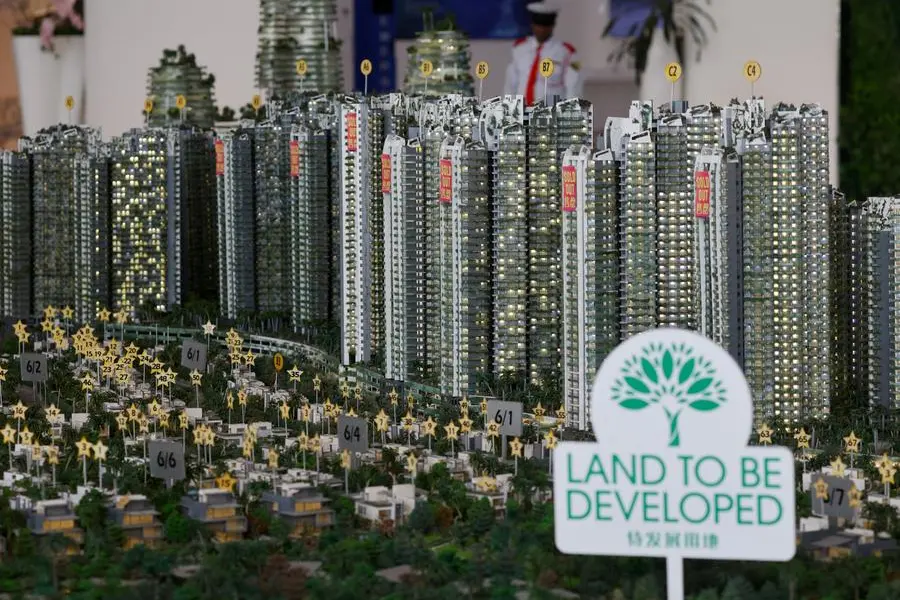PHOTO
KUALA LUMPUR/ISKANDAR PUTERI, Malaysia - A s cash-strapped developer Country Garden battles to stave off default, its sprawling $100 billion development in Malaysia has come under scrutiny from creditors even as the Southeast Asian nation dangles financial incentives to lure investments.
Billed as a paradise with turtles and white-sand beaches, Country Garden's Forest City development in the state of Johor next to Singapore aims to house 700,000 people across 7,000 acres on four reclaimed islands upon completion in 2035.
Seven years in, Country Garden has invested 20 billion ringgit ($4.3 billion) in the project, Forest City said, a far cry from the initial $100 billion plan. Today, with development still in progress, it houses fewer than 10,000 people - about 1% of its target.
Forest City has become emblematic of the risks Country Garden and some of its Chinese peers took on with their debt-fuelled building boom not just at home but also in offshore markets.
As it struggles with weak cash flow and a wall of repayment obligations, Country Garden's prospects of deploying additional capital to the project now look increasingly challenging, analysts say. The Chinese developer is also unlikely to see any revenue boost from the project any time soon.
Late last month, Forest City said the project is proceeding as planned despite issues tied to the "political landscape and interference, economic stability, government policy".
"The company is also always prepared to review and to re-evaluate Forest City's development plans after 2025 if there is a current need to do so," it said, without elaborating on its plans or the significance of the 2025 review date.
Forest City, a joint venture between Country Garden and a private Malaysian company backed by the Sultan of Johor and the state government, has been beset by problems ranging from environmental to regulatory issues since its inception in 2016.
As financial stress mounts on Country Garden, help from the Malaysian government will be crucial for the success of the development and the company may have to bring in external investors to revive the project, said Foo Gee Jen, Group Managing Director at real estate agency and consultancy CBRE-WTW.
"Moving forward, I believe they need to parcel it out and invite JV partners to monetise some of the assets. That will be able to fast-track development of Forest City," he said.
The office of Malaysian Prime Minister Anwar Ibrahim did not respond to questions seeking comment on the developer's financial woes.
HOME TRUTHS
Forest City said around 55,000 people visit its sales gallery each month and two hotels with 600 rooms combined, including a five-star golf resort, "are always fully booked."
"Seeing is believing," Forest City said in an email response.
What Reuters saw on a recent trip appeared quite different.
Empty palm tree-lined roads led to a mall where a karaoke lounge, a birds-nest museum and a herbal medicine shop were among the outlets shuttered.
The four-storey mall had only around a dozen shops open, with cleaners outnumbering shoppers. One of the hotels was largely empty and the rooftop bar that sat atop it remained closed even though its owners told Reuters in February it would open in March.
The sales gallery featured a massive replica of the development, with many residential blocks marked "sold out" or "fast selling". But over the space of an hour only a few families checked out the large showroom.
Several property agents said there was scant demand for units as potential buyers were worried about its low occupancy rate, environmental concerns and a lack of economic development.
"People don't want to buy into a block where there are just a few residents," said one agent, who declined to be identified due to the sensitivity of the issue.
Another agent said his client was looking to sell a unit after three years as he was unhappy with the pace of development.
Forest City said 28,000 housing units have been completed so far, with more than 80% sold to buyers from at least 30 countries.
BONDHOLDER TARGET
Country Garden has fewer offshore projects compared to some of its Chinese peers, and some analysts expect Forest City to be a target for some of the holders of its dollar bonds if the developer is not able to meet its debt liabilities.
"The land plot itself is valuable," a Singapore-based bondholder of Country Garden said, while highlighting the complications of dealing with a local government joint-venture.
Last month, Malaysia's central bank said local banks had limited exposure to Country Garden amid concern about its financial stress.
Anwar, Malaysia's prime minister, has designated Forest City a "special financial zone" to attract investment, which Forest City said would help with its marketing.
Anwar did not say why his government was introducing incentives, but analysts say it could be because of Country Garden's recent financial troubles, the project's history of negative publicity and an oversupply of property in Johor, the highest in Malaysia.
Still, for some Forest City residents, lower prices compared to Singapore and the quiet pace of life suits them fine.
"If not for my business back home, I'd love to live here permanently. It's so relaxing and prices are affordable," Chinese citizen Yang Ming Han, in her 30s, told Reuters.
"Although home values haven't increased and it is not a good investment compared to properties in Singapore, living here is really nice."
Loh Wee Loon, who has investments in five businesses in Forest City, is confident China's real estate debt crisis won't pose any issues.
"I don't think the troubles in China are a problem. It is a different management and I'm also confident because Forest City has the backing of the Johor Sultan." ($1 = 4.6710 ringgit) ($1 = 1.3599 Singapore dollars)
(Reporting By Xinghui Kok in Iskandar Puteri, A. Ananthalakshmi in Kuala Lumpur and Yantoultra Ngui in Singapore; additional reporting by Xie Yu in Hong Kong, Writing by Anne Marie Roantree; Editing by Lincoln Feast.)





















